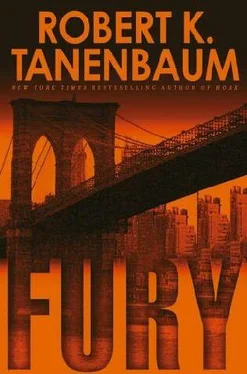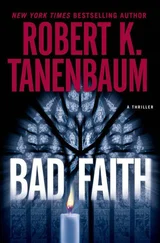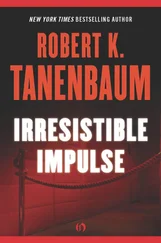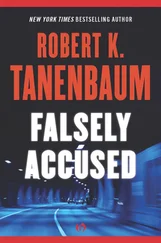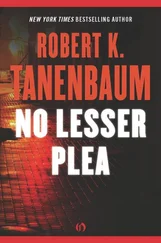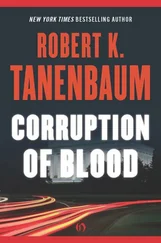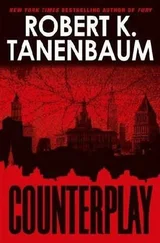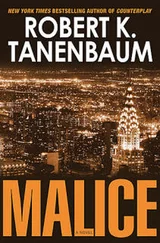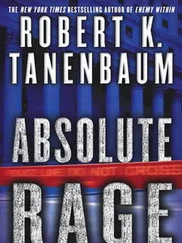Robert Tanenbaum - Fury
Здесь есть возможность читать онлайн «Robert Tanenbaum - Fury» весь текст электронной книги совершенно бесплатно (целиком полную версию без сокращений). В некоторых случаях можно слушать аудио, скачать через торрент в формате fb2 и присутствует краткое содержание. Жанр: Криминальный детектив, на английском языке. Описание произведения, (предисловие) а так же отзывы посетителей доступны на портале библиотеки ЛибКат.
- Название:Fury
- Автор:
- Жанр:
- Год:неизвестен
- ISBN:нет данных
- Рейтинг книги:4 / 5. Голосов: 1
-
Избранное:Добавить в избранное
- Отзывы:
-
Ваша оценка:
- 80
- 1
- 2
- 3
- 4
- 5
Fury: краткое содержание, описание и аннотация
Предлагаем к чтению аннотацию, описание, краткое содержание или предисловие (зависит от того, что написал сам автор книги «Fury»). Если вы не нашли необходимую информацию о книге — напишите в комментариях, мы постараемся отыскать её.
Fury — читать онлайн бесплатно полную книгу (весь текст) целиком
Ниже представлен текст книги, разбитый по страницам. Система сохранения места последней прочитанной страницы, позволяет с удобством читать онлайн бесплатно книгу «Fury», без необходимости каждый раз заново искать на чём Вы остановились. Поставьте закладку, и сможете в любой момент перейти на страницу, на которой закончили чтение.
Интервал:
Закладка:
Louis did not particularly believe that The Man was holding down his people. In fact, he thought a large percentage of his people were too stupid to walk their dogs. He much preferred the company of the fawning white liberals who peed all over themselves to coax him into accepting invitations to their parties-living proof that they weren't racists like those Nazis in the Republican Party. His monthly quota of invitations doubled after he started getting involved in politics and quickly made himself one of the top power brokers of the black vote.
Early on, he'd found it advantageous to keep a cadre of young black thugs on his payroll who could be counted on to show up at any staged event and work their way in front of the television cameras. They'd angrily denounce whatever Louis had decided and shout slogans and look for all the world like the beginning of a race riot, until Louis showed up to calm them down and bring peace to the situation. The white liberals, who feared unruly blacks the same way the antebellum South used to view a slave uprising, would then breathe a sigh of relief and extend their invitations so they could tell him in person that they were relieved they could count on his "voice of reason" when all looked lost. Their hearts spilling over with gratitude, they'd ask what could be done to prevent such further uprisings, which was his cue to suggest that they contribute to various charitable organizations in the black community. He didn't bother to tell them that most of these were controlled by his employees, who were adept at siphoning off the biggest share for his private bank accounts. Of course, a small number of "good works," as his hated mother used to say, served to keep up appearances but these were mostly used whenever the media needed a feel-good feature with some black faces in the photographs and videos.
As a result, Louis had grown fatter and richer, not necessarily in that order. He'd bought a palatial home on the Upper West Side-close enough to Harlem to appear to be still in touch with "my people," but far enough away to alleviate the fears of whites he invited to dinner at his house.
On occasion, someone in the black community-especially those pesky ministers who declined to be bought and were his biggest critics-would question his choice of neighborhood and friends. But he'd piously explain to his sycophants in the media and from friendlier pulpits that it was important for black men and women to see other successful black men and women living in fine estates as good as any white man's, and collecting fine art and finer automobiles. "I see myself as a role model for young men and women of my community. They see me and know there is no height to which they cannot aspire with hard work and perseverance."
Those who persisted in their criticism would find themselves looking down from their pulpits into the angry eyes of those same young men who mugged for the television cameras. Nobody seemed to notice that an unusually high number of outspoken ministers and other conscientious community leaders became victims of crime-assaults and robberies, after which they tended to grow strangely quiet, although not always.
Such drastic measures weren't always necessary. Several ministers earned a better part of their "salaries" from monthly deposits set up at banks in their names, and were happy to invite him to deliver the occasional sermon-or call to action-in his fine, stentorian voice that added to the grandeur (as he saw it) of his three-hundred-plus pounds.
Louis kept a small, plain office in the heart of Harlem. It was the quintessential poor man's lawyer office furnished with chairs, desks, and tables that looked as if they had been taken from a high school cafeteria. He put in an appearance two days a week and did a certain amount of pro bono work, especially if there was a possibility of publicity. White cops shooting black teenagers. White slumlords evicting old Puerto Rican tenants.
Occasionally, he even managed to break into national headlines, such as during the case of a fourteen-year-old girl from the projects who claimed she'd been abducted by three white men who'd raped her and then branded her arm with a swastika before letting her go. Louis had appeared on the steps of 100 Centre Street with his arm draped around the girl, decrying "the racists in our midst" and lambasting the New York City police for not trying hard enough to catch the criminals.
During subsequent questioning, the girl had given conflicting reports. The NYPD spokesman indicated that the investigation was "ongoing" but that the BOLO (Be on the Lookout) for the suspects had been canceled. Louis held another press conference, this one outside his Harlem office, where he suggested that a "white, Catholic-controlled police department" was reluctant to pursue the case because of "racists in their own midst, and where that might lead." Sopping up a monsoon of sweat, he even suggested that the perpetrators were police officers.
"My client, who is only gradually recovering from this traumatic event-including, with the aid of a counselor, regaining memories she had understandably blocked-remembers that her assailants 'talked like police officers.' I'm not saying that they were police officers, but it is certainly a possibility." His Greek chorus of young hoodlums mugged ferociously for the television cameras and jeered a couple of cops who'd shown up to see why the crowd had gathered.
When it finally came out that the girl made up the story because she got pregnant by her twenty-one-year-old boyfriend and had simply been afraid to tell her parents, Louis did not offer an apology. Instead, he went on the offensive. The girl, he said, was the exception, not the rule.
"For every mixed-up child who tells a little fib to get out of trouble, there are hundreds of young black women who have been abducted and raped by the sort of men my client described, and the police do nothing."
Undaunted and logically incomprehensible, he then threatened to sue the City of New York because one of the detectives had slipped up and actually referred to the girl as "a liar" in the New York Post, which had, of course, used the statement as its main front-page headline. For once, J. Samuel "Settlement Sammy" Lindahl, the city's attorney known as Corporation Counsel, held firm under pressure from the Police Benevolent Association, the powerful police union, and because anybody with the vaguest idea of the law knew the city had no liability.
Although publicly he'd expressed outrage at Lindahl's refusal, privately Louis smiled, slicked back his heavily pomaded hair, and moved on. Didn't hurt to try. He laughed to himself.
Louis's favorite office, however, was actually in a Fifth Avenue high rise. The interior had been tastefully furnished in rich leathers, dark woods, and lots of polished brass by the city's hottest professional designer, who'd charged a cool million dollars for her services. That was where he spent the bulk of his working hours, meeting with his "money clients"-many of them white businessmen who merely wanted him to "smooth the way" for their ventures into the black neighborhoods of Manhattan, as well as across the rivers in Brooklyn and New Jersey.
Of course, such favors came with a price. After all, he had expenses that went beyond maintaining two law offices, the dozen or so classic automobiles, a condominium in Aspen, Colorado, that he rarely visited because he didn't really like snow, and frequent vacations in five-star hotels around the world. His most expensive possession, however, was Tawnee Renoso, a pretty little sixteen-year-old child of a black woman and a Puerto Rican man.
Louis was married. In fact, he'd been married since shortly after getting out of law school. Back then, Bobette Jones had been an attractive, light-skinned young woman who'd actually bought into his line that he was an idealistic lawyer out to champion the cause of poor people.
Читать дальшеИнтервал:
Закладка:
Похожие книги на «Fury»
Представляем Вашему вниманию похожие книги на «Fury» списком для выбора. Мы отобрали схожую по названию и смыслу литературу в надежде предоставить читателям больше вариантов отыскать новые, интересные, ещё непрочитанные произведения.
Обсуждение, отзывы о книге «Fury» и просто собственные мнения читателей. Оставьте ваши комментарии, напишите, что Вы думаете о произведении, его смысле или главных героях. Укажите что конкретно понравилось, а что нет, и почему Вы так считаете.
